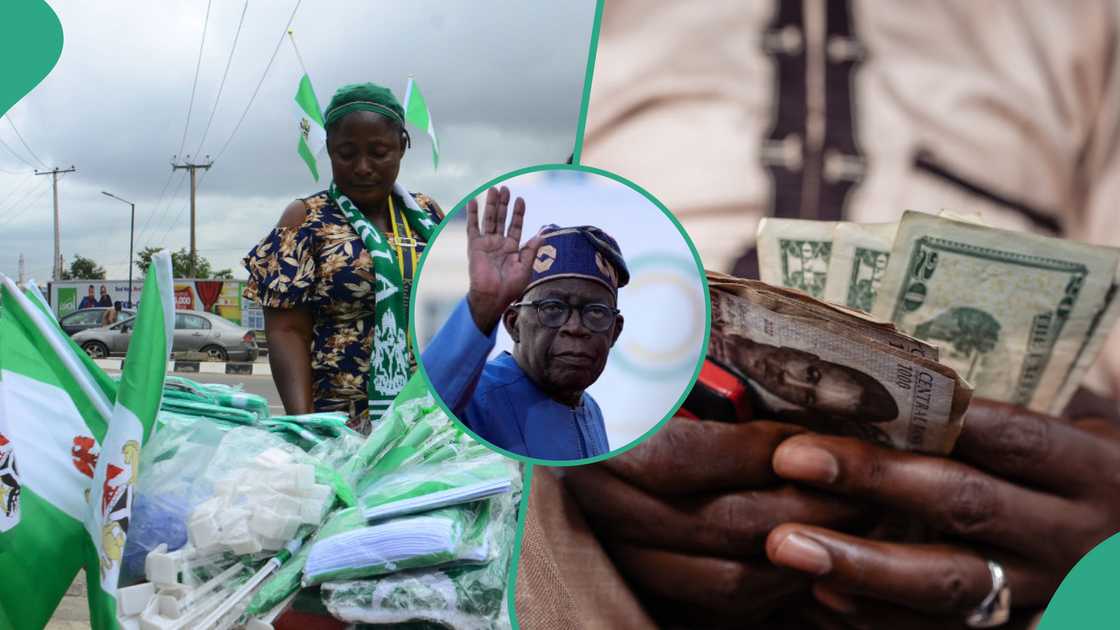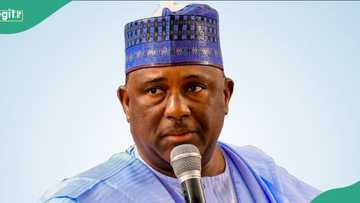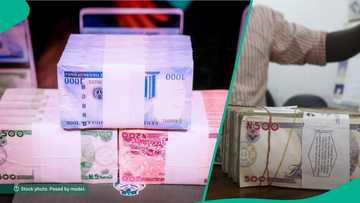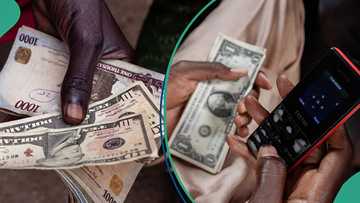Nigeria @ 64: Naira from Symbol of Pride to Cause of Despair
Today, Tuesday, October 1, 2024, marks Nigeria's 64th Independence anniversary, but the celebration has been subdued by the ongoing economic hardship facing citizens.
Don't miss out! Join Legit.ng's Sports News channel on WhatsApp now!
The naira, one of the early symbols of Nigeria’s independence from Britain’s colonial rule in 1960, has become a source of economic hardship.
Almost daily, citizens' livelihoods and wages are eroded due to the naira's poor performance in the forex markets.

Source: Getty Images
Naira fall and Independence Day
Nigeria dumped the pound sterling and adopted the naira as its national currency in January 1973 with excitement.
Coined from the word “Nigeria” by Obafemi Awolowo, the “naira” gave the people a sense of national identity different from the colonial pound sterling.
The naira symbolised pride and exchange at par with the dollar in the 1970s. Today, the story is different, and it seems there is no end.
According to data from the CBN, since 2001, the naira has lost 1,319.16% of its value, dropping from an exchange rate of N112.85/$ to the current rate of N1,601.52/1$ in the official market.
The parallel market, also known as the black market, is even worse, with the naira exchange being as high as N1,700 against the dollar.
This depreciation has triggered record-high inflation, skyrocketing food prices, and a loss of purchasing power for everyday Nigerians.
10 worst-performing currencies
In a recent report by Bloomberg, the naira was listed among the worst-performing currencies in the world against the US dollar.
- Kenyan Shilling: -20.9%
- Congolese Franc: -24.0%
- Burundi Franc: -27.6%
- Zambian Kwacha: -29.5%
- Turkish Lira: -36.7%
- Malawian Kwacha: -39.1%
- Angolan Kwanza: -39.2%
- Nigerian Naira: -55.0%
- Argentine Peso: -78.1%x
- Lebanese Pound: -89.9%
Hope ahead for naira
The federal government and the Central Bank of Nigeria are making efforts to find a solution to the free fall of the naira and have introduced several new policies.
Some of the policies include the reintroduction of RDAS (Retail Dutch Auction System), which is the direct sale of FX through banks to end users, consistent intervention, and attracting foreign investors to ease pressure on the naira.
However, Aminu Gwadabe, the president of the Association of Bureau De Change Operators of Nigeria (ABCON), in a chat with Legit.ng, believes that the solution lies with Bureau De Change operators.
He stressed that BDCs can be important in helping the CBN achieve naira stability.
His words:
"ABCON as a body will continue its advocacy on BDCs inclusion in the Nigerian Autonomous Foreign Exchange Market (NAFEM) which is the official exchange market window.
"The BDCs are the third leg of the Nigeria foreign exchange market at conception for moderating and correcting the volatility in the foreign exchange market.
"The BDCs command the effective, efficient and transparent pass-through effect of the apex bank foreign exchange policies, as we witnessed in 2006, 2009, 2017 to 2020 before the outbreak of COVID 19.
"We have seen the unintended consequences of various CBN policies, including license suspensions from 2021 to date, and how they have significantly depreciated our local currency."

Read also
Billionaire Abdulsamad Rabiu loses billions of dollar as his wealth declines over forex policy
Naira falls again in official, parallel markets
Legit.ng earlier reported that despite the relative improvement of foreign exchange turnover in the Nigerian Autonomous Foreign Exchange Market (NAFEM), the Nigerian naira tumbled against the US dollar.
The naira hit another low in both the official and parallel markets segments of the FX markets, trading at N1,554.65 to a dollar on Thursday, July 11, 2024, as against the N1,534 it traded on Wednesday, July 10, 2024.
Traders in the FX market exchanged $348.82 million as Forex turnover in the official market.
Proofread by Kola Muhammed, journalist and copyeditor at Legit.ng
PAY ATTENTION: Сheck out news that is picked exactly for YOU ➡️ find the “Recommended for you” block on the home page and enjoy!
Source: Legit.ng




